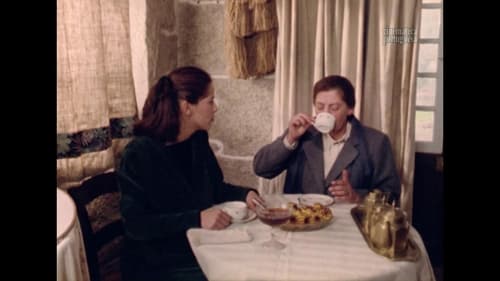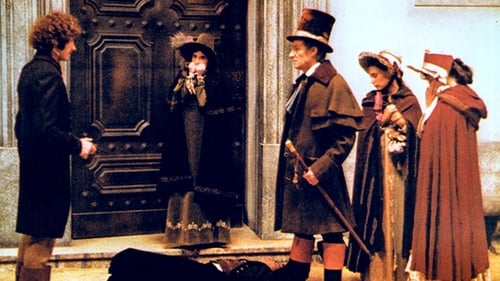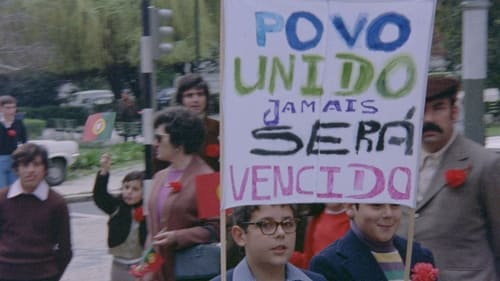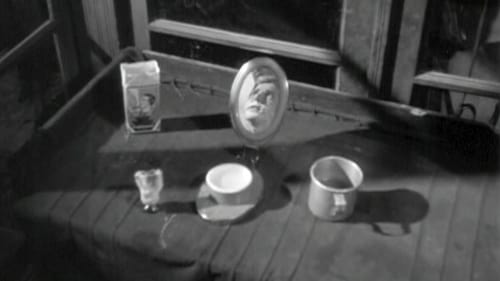
Director of Photography
Um jogo de olhares entre as fotografias de Gérard Castello Lopes, a sua importância no contexto da fotografia contemporânea e, especialmente, para a fotografia portuguesa.

Director of Photography
"French television came up with the idea of Se Deus Quiser (but they didn't carry it through), which consisted in inviting six European directors to describe their homeland in a film. When my friend Jacques Dercourt contacted me - he had seen Nós Por Cá Todos Bem at Cannes - I told him I like the idea a lot and I proposed a to Várzea and to my mother, that is, a confrontation between images and sound, memory and sentiment" (Fernando Lopes).

Director of Photography
In the summer of 1870, Raquel, who owns a farm, and lives secluded in her mansion with an old butler and a handful of servants, feels proud when an odd acquaintance comes by. Adriana and her daughter-in-law, Ermesinda, a very young girl, just happen to be visiting - the second time in 15 years for Adriana, and the first time for the teenager Ermesinda. The meeting seems to be pleasant, and yet, for reasons untold, there is coldness and reserve between Adriana and Raquel. Their ambiguous relationship will be revealed, when by accident old wounds are reopened.

Director of Photography
Tomás é um jovem adolescente que luta pela liderança de um pequeno grupo marginal. Uma noite, no mundo que ele não consegue dominar, a sua precipitação leva à morte de um dos membros do grupo. Laura, a possível testemunha do crime, torna-se uma ameaça. Tomás aproxima-se dela para a intimidar. Laura apaixona-se por ele. Mas ela não lhe dirá o que viu naquela noite e o seu silêncio é para Tomás sinal de perigo. No único mundo que conhece, Tomás vive a obsessão das ameaças que o cercam. A paixão de Laura é a mais perturbadora de todas.

Director of Photography
Ofelia is the daughter of photographer Miguel and of deceased circus artist Lea. When her father is hospitalised with a nervous breakdown, she decides to find out the reason and in doing so discovers the truth about the relationship between her parents and the true fate of her mother.

Director of Photography
Pontius Branco was a climber of the economy, climbed by money like Mount Everest. aggressive businessman. His wife Bernarda felt betrayed. He replaced her for the orgies between the purchase intervals, sells and deceives. Here comes the train from 15:30 to Lisbon a coming emigrant from France with a five year old daughter in her arms and attacks Pontius in his stronghold, demanding recognition of the daughter of sin, Libertina that he had made her "bidonville» on the city of light. Bernarda hires a private detective to obtain evidence of Pontius's adultery with a curvaceous blonde, whose dream was to own butchers, fishmongers and vegetable places in a shopping center. Pontius who all deceived and this triangle (not Bermuda), weaves the web and bore's the head of the entrepreneur. A perfect luxury crime puts the police overtime. Time passes and only after the Seventh Day Mass is brought to light when the sky was given the eclipse of the moon ...

Director of Photography
Adelaide Coelho da Cunha, daughter of the founder of the newspaper "Diário de Notícias", married to Alfredo da Cunha, then director of this newspaper, and mother of José, who is 20. This educated, cultured woman, falls in love with the chauffeur, who is youger than her and from a different social background. This passion leads to confronting the established order of things and the standards of social behaviour of a wife and mother. She may at the same time be heroine and victim of her own courage in deciding to make a final break from the whole family status and run off with the chauffeur. When his wife runs off with the chauffeur, Alfredo da Cunha with the aid of some of the eminent doctors of the day, has her declared irresponsible and incapable of administering her assets, and on this pretext he has her inprisoned in a mental hospital.

Jogador de Poquer
The young girl, Antónia Margarida Castelo Branco, is handed over by her mother to Brás Telles de Meneses because of the obscure interests between rural aristocratic families in the North. Brás is a ruined man, a bohemian with a reputation for violence and erratic behaviour. Antonia’s fortune is the first sacrifice made by the young wife. Fascinated by the man who humiliates and ill-treats her, she follows him in a pilgrimage to increasingly barren lands, to increasingly less hospitable houses.

Director of Photography
The young girl, Antónia Margarida Castelo Branco, is handed over by her mother to Brás Telles de Meneses because of the obscure interests between rural aristocratic families in the North. Brás is a ruined man, a bohemian with a reputation for violence and erratic behaviour. Antonia’s fortune is the first sacrifice made by the young wife. Fascinated by the man who humiliates and ill-treats her, she follows him in a pilgrimage to increasingly barren lands, to increasingly less hospitable houses.

Director of Photography
Based on the work by Fernando Pessoa - a "message" about the destinies of Portugal - not just in isolation but looking at them as precursors and announcers of the fate of the entire planet.

Director of Photography
A story about character created by Reinaldo Ferreira (1897-1935), action reporter, mystery novelist and emotion journalist.

Director of Photography
Um nobre alentejano, de família muito conservadora, pretende reconquistar Olivença, fazendo voltar a situação aos tempos do Tratado de Tordesilhas. Para tal, cria dois movimentos, que se preparam para o grande dia. No entanto, tais planos não surtem efeito, pois a filha do Alcaide de Olivença apaixona-se pelo filho do Barão de Altamira, e a guerra será outra...

Cinematography
A acção decorre em Lisboa, numa pensão da nova Avenida Amirante Reis cerca de 1918-26, expondo - através duma encenação de valores cromáticos - os amores duma mulher de passado misterioso e futuro incerto. Dona Elvira promete arranjar emprego a José através da típica cunha portuguesa. Em paralelo, revelam-se aspectos bizarros e figuras excêntricas da vida citadina, incluindo a tragédia da actriz Maria Alves - assassinada pelo próprio empresário - já recriada por Reinaldo Ferreira, em O Táxi Nº 9297 (1927)

Production Manager
José Pereira, a young medical graduate, meets a young and ardent Maria Eugénia. The time is the eve of the Portuguese Revolution, on 24th April 1974 and only a short time elapses between courtship and marriage. The young pair are very much in love, but José begins to have doubts about the "honesty" of such intense feelings of love, feelings which are too intense (or hot) to him . If Maria Eugénia is like this with him, will she be the same with other men?In the meantime, the Revolution takes its course. José, who previously had been persecuted because of his opposition against the old regime, now feels "left behind" and frustrated.

Director of Photography
Baseada no romance homónimo de Mário Zambujal, esta excelente comédia portuguesa conta com um elenco de luxo, do qual fazem parte, entre outros, Nicolau Breyner, Lia Gama, João Perry e Maria do Céu Guerra. A história anda à volta de um grupo de amigos que se dedica a pequenos assaltos, até que é subornado por um misterioso italiano que os desafia a roubar obras de arte num museu de Lisboa. Entre os preparativos para o grande golpe, vamos conhecendo os membros do grupo e os caminhos que os levaram à marginalidade, até que chega o dia do tão esperado assalto. Mas as coisas não correm como estava previsto…

Cinematography
Situado no principio dos anos 70, Pôr do Sol no Areeiro tem uma excelente história, definindo a preceito a mentalidade de uma burguesia das Avenidas que negoceia carros, sentimentos e pessoas com a desenvoltura de uma amoralidade que é bem típica da sociedade lisboeta desse tempo.

Director of Photography
Fazendo parte das médias metragens para TV Lisboa Sociedade Anónima, este O Banqueiro Anarquista, é bem o exemplo do que um texto fabuloso (de Pessoa), uma cenografia exuberante, uma camara atenta e um actor (Santos Manuel) no seu mais arriscado e conseguido trabalho podem fazer. O resultado é um filme cinicamente divertido, marcadamente representativo da 1ª Républica, onde durante quase uma hora o espectador se deleita (e inquieta, claro) com as falácias de um texto a que Santos Manuel dá o peso de um corpo e de uma voz, quer dizer, torna presente. O Banqueiro Anarquista é uma sátira brilhante aos discursos politicos, de uma inteligencia e de uma ferocidade a toda a prova.

Director of Photography
In 1974, not long after the death of Portuguese dictator Salazar, who had ruled Portugal from the early '30s to the late '60s, a group of disgruntled Army officers held a coup. They were even more disgruntled when they realized how the coup was being manipulated by leftist officers to instigate genuine elections and establish a constitution for the first time in Portuguese history. Though their intent was to form a radical socialist state, circumstances prevented this, and a genuine parliamentary democracy emerged. This film explores the circumstances of a right-wing businessman during those times. The man is an old-fashioned authoritarian, whose attentiveness to the needs of his mistress, wife and son is crude where it exists at all.

Cinematography
A man finds a mansion with a strange inhabitant.

Producer
A man finds a mansion with a strange inhabitant.

Director of Photography
A story about doomed love between two people from different worlds and the impact in their lives.

Sound Editor
The Mother is one of Monteiro’s first essays on the universe of Portuguese oral culture, folktales and obscure colloquialisms. The plot revolves around a traditional tale about theft, greed, an ubiquitous mother, and the links between the worlds of the living and the dead.

Production Manager
The Mother is one of Monteiro’s first essays on the universe of Portuguese oral culture, folktales and obscure colloquialisms. The plot revolves around a traditional tale about theft, greed, an ubiquitous mother, and the links between the worlds of the living and the dead.

Cinematography
The Mother is one of Monteiro’s first essays on the universe of Portuguese oral culture, folktales and obscure colloquialisms. The plot revolves around a traditional tale about theft, greed, an ubiquitous mother, and the links between the worlds of the living and the dead.

Cinematography
In this highly theatrical TV production, Monteiro again draws on the world of folklore – and, more precisely, on the widespread sexual connotation of the pomegranate – to tell a tale of love, envy, treason and mistaken/double identities.

Director of Photography
Feito para televisão, Os Dois Soldados é uma história interpretada por actores amadores, habitantes da aldeia transmontana de Tronco, no concelho de Chaves

Director of Photography
With a strong documentary element, "Nós Por Cá Todos Bem" mixes professional actors with the inhabitants of a small village, telling the story of a small film crew in a village living day to day.

Director
Film directors with hand-held cameras went to the streets of Lisbon from April 25 to May 1, 1974, registering interviews and political events of the Portuguese "Carnations Revolution", as that period would be later known.

Cinematography
Sofia e a Educação Sexual sofreu as vicissitudes da época de transição política, vindo a estrear em Outubro de 1974, como “filme proibido pela censura”. O sucesso comercial - entre a sugestão do título, e a euforia do estatuto de espectador - culminaria uma aliciante eficácia, da moral em jogo aos jogos da moral. Também argumentista, Geada encenou o itinerário de revelação, uso e fuga de Sofia - ao confrontar-se, após uma adolescência reprimida, com o requinte social, fútil mas solene, da alta burguesia a que pertence: o cinismo e a hipocrisia em que se desvenda, afinal, um perverso ritual de classe.

Director of Photography
João, um jovem desajustado e mal-amado à procura de respostas, abandona os estudos e, através das influências e contactos do pai, começa a trabalhar num escritório. Rodeado de mulheres, acaba por se envolver com Inês, a sua chefe, uma mulher solitária que vive assombrada pela morte do irmão na guerra colonial. Mas se, inicialmente, a sofisticação e a posição social de Inês entusiasmam João, no final ele acaba por preferir Leonor, uma rapariguinha de valores mais tradicionalistas. A obsessão e o ciúme levam Inês à loucura, que põe termo ao seu sofrimento matando João a tiro.

Narrator (voice)
One of the first films that looks at the Portuguese region of Trás-os-Montes. From the mask called “careto” and the popular festival to the everyday reality.

Cinematography
One of the first films that looks at the Portuguese region of Trás-os-Montes. From the mask called “careto” and the popular festival to the everyday reality.

Director
One of the first films that looks at the Portuguese region of Trás-os-Montes. From the mask called “careto” and the popular festival to the everyday reality.

Director of Photography
Adaptação cinematográfica do romance homónimo de Carlos de Oliveira. Encena um Portugal rural desencantado, sombrio e enclausurado, no final da década de 1960, e que um crime brutal vem abalar.

Director of Photography
This documentary shows a typical Sunday in Mozambique's capital, tourist main attractions, an inquest in Lisbon about the perception of the people in the street about what life was like in that African colony (or, as the Government had it then, "province"), and then interviews and scenes of Lourenço Marques fishermen and a bar waitresses. African folk music and dance were used as documents and background for the text narration.
































